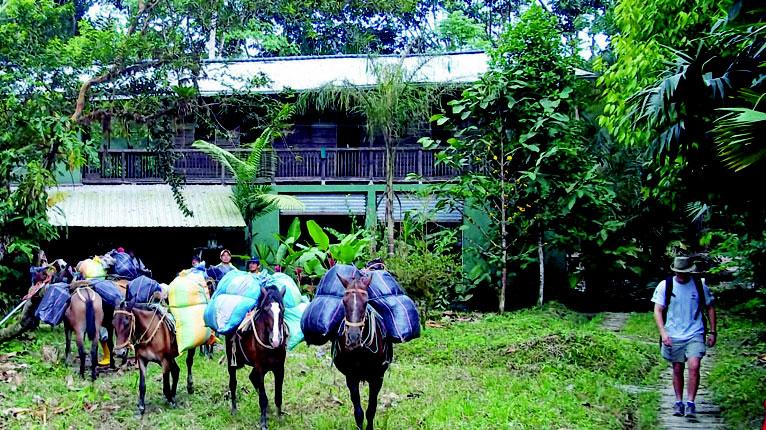Only two weeks after the first trek through the jungle, the last trek had arrived.
The now familiar sights and sounds were all around on this final hike. The water from the river we had just trudged through sloshed in my nearly knee-high black rubber jungle galoshes. The sun gleamed through the vibrant red tips of the columnea leaves, creating the “stained-glass of the forest.” The moss and vines covering the trees I clung to for support released their water reserves as I stumbled through the tangle of roots and dead foliage on the forest floor. Occasional rays of sunshine peeked through the dense canopy to hit my skin and leave me with an unexpected touch of warmth.
From May 7 to May 25, I and 16 other Alabama students were immersed in these surroundings daily. Our group traveled through Ecuador studying tropical plant diversity as part of Capstone International’s Alabama in Ecuador program and was led by Dr. John Clark, Cassandra Coleman and Steve Ginzbarg.
Bilsa Biological Station, where the group spent six of the 18 nights in Ecuador, was the location of the above-described jungle scene. The 7,500 acre reserve is located in western Ecuador and is part of the 300,000 acre Mache Chindul Ecological Reserve.
Ecuador, which is slightly smaller than the state of Nevada, boasts some of the highest biodiversity levels in the world, providing opportunity for students to interact with many rare flora and fauna. The closeness to nature provoked interesting behavior from some students.
“When you’ve got a 200 pound, six-foot 21 year-old barricading the door to keep the monkeys out, you know you’re in a unique place,” said Schilling Nechtman, a junior majoring in biology.
Bilsa’s main facilities are located in the natural habitat of howler monkeys, which make a noise quite unlike the noise of the monkeys in the Birmingham Zoo.
“They sounded just like you would imagine a dinosaur to sound: a deep, loud roar,” said John Nelson Williams, a senior majoring in management who built the barricade Nechtman described in their shared bedroom one night.
Though not a luxury resort by American standards, Bilsa is an incredible place. Sloths, caterpillars the size of your hand and hummingbirds joined the monkeys in the forests, mere footsteps away from the house we slept in. The universal sounds of laughter and a ping-pong ball bouncing off a table combined with the welcoming smiles of the staff mirrored the Southern hospitality of home, even deep in the Latin American jungle.
The library, which depicted the wildlife that was only steps away, was shelved next to a hammock, illustrating the effortless intermingling of academia and joy that fills Bilsa.
“I had no idea I could be so happy while studying,” said Katie Boswell, a senior majoring in biology.
Though each student was looking for different plant species in the forest, from melastomes to orchids to pipers, we all found one thing that wasn’t listed on the syllabus: camaraderie.
“From the plant diversity to the culture, I have learned so much from the weeks I spent in Ecuador,” said Blake Ellett, a senior majoring in human and environmental sciences. “I will always remember the people and memories gained on this unbelievable trip.”
For more information on Bilsa Biological Station and the Alabama in Ecuador program, contact Dr. John Clark at [email protected].









